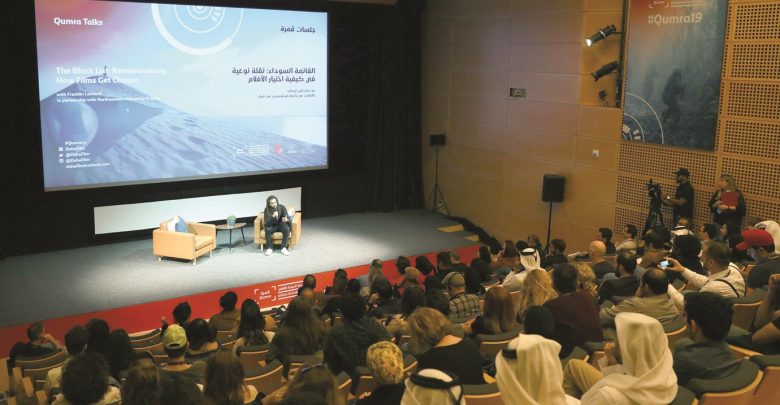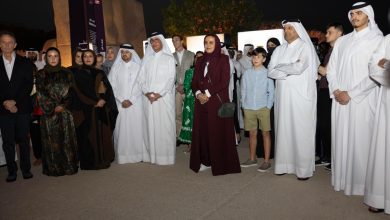
Qumra 2019: Mentors share pearls of wisdom
مدربو صنّاع أفلام «قمرة» يعرضون تجاربهم السينمائية
Some of the Arab world’s most recognised filmmakers shared their insights for young filmmakers starting out in the industry at the fifth Qumra, the annual industry event by the Doha Film Institute (DFI).
Qumra 2019 filmmaker mentors including screenwriter, director and producer Ghassan Salhab, filmmaker and visual artist Karim Aïnouz, filmmaker and poet Annemarie Jacir, and film director and producer Tala Hadid highlighted the importance of filmmakers staying true to their voice and the need for development initiatives such as Qumra to foster the next generation of filmmaking talents.
Karim Aïnouz, critically acclaimed director of films including Madame Satã (2002) and Love for Sale (2006), said: “My advice to aspiring filmmakers here at Qumra is to protect your vision and stay true to yourself and what it is that you want to talk about. You need to think: who is it that you want to talk to, and what do you want to say to them? You also need to be able to answer these questions to people in the industry, who need to be convinced that your film should be made.”
This was a sentiment echoed by Beirut-based Ghassan Salhab, director of Beyrouth Fantôme (1998) and Terra Incognita (2002) , who also writes about and teaches film. He said: “Young filmmakers here at Qumra will benefit from a lot of advice about their projects from people like me. There’s a danger that all this advice will be overwhelming. It’s important not to get lost in other people’s voices and listen to yourself and what it is you want to achieve. You are your most important critic.”
All of the mentors agreed that initiatives like Qumra were vital in nurturing emerging talent in the industry, and much-needed in the Middle East region as it provided for “a real exchange” between industry experts and new filmmakers.
“For Arab filmmakers today, there are not a lot of places they can go for support,” said Annemarie Jacir, whose most recent film Wajib (2017) won 18 international awards. “Qumra is really unique in the region as a vehicle to help develop the talent of the next generation of Arab filmmakers. I wish that this kind of initiative had been available when I was starting out in the industry. My advice to new filmmakers here is to take advantage of the opportunity and make important connections that could help you throughout your career.”
Morocco-based Tala Hadid, whose film House in the Fields (2017) a DFI supported film, said that she enjoys being a Qumra mentor because she gets an opportunity to learn as well as to teach. She said: “Each year I’m impressed by the high calibre of projects I see at Qumra. These are a bunch of really smart kids whose projects are bold and diverse. As well as offering advice from my experience, I am inspired by the work I see at Qumra, the energy of the young filmmakers here, and the new processes and ways that they work.”
The second Qumra Talk will be at 5pm with Michel Reilhac, entitled ‘Welcome to the New Reality: How VR is Changing our World’ followed by Qumra Masters screening of Kiyoshi Kurosawa’s Tokyo Sonata will be at 7pm.
اجتمع عدد من أبرز صنّاع الأفلام في العالم العربي، لمشاركة نصائحهم مع صنّاع الأفلام الذين يخوضون تجاربهم الأولى أو الثانية في الإخراج خلال النسخة الخامسة من ملتقى قمرة السينمائي، الحدث السنوي لمؤسسة الدوحة للأفلام.
وبهذه المناسبة، قال كريم عينوز المخرج الذي اشتهر بالعديد من الأفلام مثل «مدام ستا» (2002)، و»حب للبيع» (2006): «أنصح صنّاع الأفلام الطموحين في قمرة بحماية رؤيتهم وعدم التخلي عن صوتهم الحقيقي وعن الأمور التي يريدون التحدث عنها فعلياً، عليك أن تسأل نفسك: من الذي تريد التحدث معه؟ وما الذي تريد قوله؟ وعليك أيضاً الإجابة عن هذه الأسئلة أمام الأفراد المسؤولين عن صناعة الأفلام، والذين يجب إقناعهم بضرورة إنتاج فيلمك».
وفي السياق نفسه، قال المخرج اللبناني الذي أخرج «أشباح بيروت» (1998) و»الأرض المجهولة» (2002)، والذي يُدرّس ويكتب عن الأفلام: «سيستفيد صنّاع الأفلام الشباب في قمرة كثيراً من نصائح أشخاص مثلي حول مشاريعهم، ويبقى خطر الشعور بالضغط في خضم كل هذه الإرشادات، لكن المهم هو عدم الضياع في أصوات الآخرين، والاستماع إلى صوتك أنت والأمور التي تريد تحقيقها، فأنت أهم ناقد لنفسك».
وبدورها، قالت آن ماري جاسر التي حصل فيلمها الأخير «واجب» (2017)، على 18 جائزة عالمية: «لا يوجد كثير من الأماكن التي يستطيع صنّاع الأفلام العرب اللجوء إليها، وتُعد قمرة الدافع الأساسي للمساهمة في دعم مواهب الجيل القادم من صنّاع الأفلام العرب، كنت أتمنى وجود مثل هذه المبادرة في بداية مسيرتي، نصيحتي لصنّاع الأفلام الجدد هنا هي الاستفادة من فرصة التعرف على الناس الذين قد يساعدونهم خلال مسيرتهم الفنية».
ومن جهتها، تحدثت المخرجة والمنتجة تالا حديد، التي دعمت مؤسسة الدوحة للأفلام فيلمها «منزل وسط الحقول» (2017)، وقالت إنها تستمتع بتولي منصب مدربة صنّاع أفلام قمرة، إذ تتسنى لها الفرصة للتعلم والتعليم، وأضافت قائلة: «كل عام يعجبني المستوى العالي للمشاريع في ملتقى قمرة».
من جهة ثانية، ترأس فرانكلين ليونارد المؤسس والرئيس التنفيذي لـ «القائمة السوداء»، أولى جلسات قمرة النقاشية، لإرشاد ودعم وتعزيز مهارات صنّاع الأفلام الصاعدين.
وأسس ليونارد «القائمة السوداء» عام 2005، لتصبح القائمة السنوية لأكثر سيناريوهات هوليود غير المُنتجة شعبية، إذ سرعان ما أصبحت من أهم الشركات في قطاع السينما التي تحتفي بالكتابة السينمائية وعمليات الإنتاج العظيمة وتدعمها، منذ تأسيسها، أُنتج أكثر من ثلث 1200 عمل من النصوص، وحققت أكثر من 26 مليار دولار في شباك التذاكر حول العالم، كما حازت الشركة 53 جائزة أكاديمية من أصل 262 ترشيحاً.
بالنسبة للسيد ليونارد فإن الهدف من القائمة السوداءهو إيجاد «أفلام غاية في الروعة.» ما كان في البداية قائمة بريدية لسيناريوهات هوليوود المفضلة غير المنتجة، أصبح منصة إلكترونية تتيح للكتاب خارج «فقاعة هوليود» أن ينشروا أعمالهم. لذا يعتقد ليونارد أن نمو القائمة السوداء ساهم في إدخال أصوات جديدة في مجال السينما السائدة.
وواصل ليونارد حديثه قائلا: «لم يتم إعداد هوليود تقليديًا لرعاية مواهب أشخاص من خلفيات متنوعة مثل منهال. أنا فخور بأن القائمة السوداء ساعدت في إطلاق وظائف للذين عادة ما يتم استبعادهم من صناعة السينما السائدة في لوس أنجلوس.



